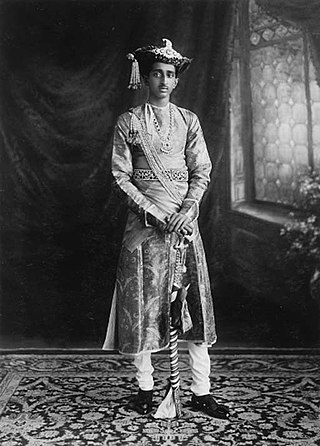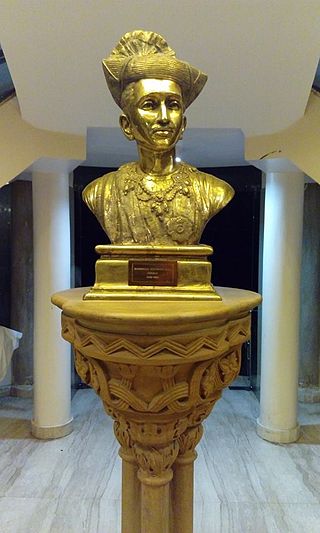Related Research Articles

Chhatri are semi-open, elevated, dome-shaped pavilions used as an element in Indo-Islamic architecture and Indian architecture. They are most commonly square, octagonal, and round.

Malhar Rao Holkar was a noble subedar of the Maratha Empire, in present-day India. He was one of the early officers along with Ranoji Scindia to help spread the Maratha rule to northern states and was given the estate of Indore to rule by the Peshwas, during the reign of the Maratha emperor Shahu I. He was founder of the Holkar dynasty that ruled Malwa.

Sir Bhupinder Singh, was the Maharaja of Patiala and a cricket player. Singh's reign as Maharaja of the princely state of Patiala, in British India, lasted from 1900 to 1938. He was born in a Sidhu royal Jat Sikh family. During his reign, Singh was most noted for his extravagance, contributions to sports, and for being an ally to the British Raj. He was also a member of the Phulkian dynasty.

Maharaja Jawahar Singh was the ruler of the Bharatpur State. He succeeded to the throne when his father Maharaja Suraj Mal Ji died in 1763.

The Daly College is a group of institutions consisting of a co-educational private boarding, day school, a private junior school, an undergraduate management school and a postgraduate business school, located in Indore, Madhya Pradesh, India. It was founded by Sir Henry Daly of the British Indian Army during India's colonial British Raj, following an English public school model. The school started in 1870 as the Residency School. It was then renamed as the East Rajkumar College in 1876, and in 1882, it came to be known as The Daly College. It was established by the Resident Governor of the erstwhile Presidency, to educate the children of the royalty, nobility and aristocracy of Central Indian Princely States of the 'Marathas', 'Rajputs', 'Mohameddans' and 'Bundelas'. It is one of the oldest co-educational boarding schools in the world.
The Battle of Pune took place on 25 October 1802 near Pune between the states of the Maratha Confederacy. The forces of the Scindia (Shinde) and the Peshwa Bajirao II were attacked by the Holkars. While the British East India Company was not involved in the battle, its outcome and aftermath led to the Second Anglo-Maratha War.

g

Bharatpur State, which is also known as the Jat State of Bharatpur historically known as the Kingdom of Bharatpur, was a Hindu Kingdom in the northern part of the Indian subcontinent. It was ruled by the Sinsinwar clan of the Hindu Jats. At the time of reign of king Suraj Mal (1755–1763) revenue of the state was 17,500,000 Gold coin per annum. The major architecture of this state include Lohagarh Fort and Deeg Palace.

Maharajadhiraj Raj Rajeshwar Sawai Shri Sir Yeshwant Rao II Holkar XIV Bahadur was the Maharaja of Indore belonging to the Holkar dynasty of the Marathas. With his first wife, he became known for a life of elegance and extravagance in the 1920s and 30s.

Maharajadhiraj Sir Raj Rajeshwar Sawai Shri Tukojirao III Holkar XIII Bahadur was the Maharaja of Indore State in central India between 1903 and 1926.

Maharajadhiraja Raj Rajeshwar Sawai Shri Sir Shivaji Rao Holkar Bahadur XII was the Maharaja of Indore belonging to the Holkar dynasty of the Marathas. He was the son of Tukojirao Holkar II and Maharani Shrimant Akhand Soubhagyavati Parvati Bai Sahib. He was educated at the Daly College, Indore, a school in central India along with the rulers of the Ratlam State, Dewas State (senior) & other Thakurs of the princely states of the Central India Agency.

The following list includes a brief about the titles of nobility or orders of chivalry used by the Marathas of India and by the Marathis/Konkanis in general.

H.H.Maharajadhiraj Raj Rajeshwar Sawai Shri Khande Rao II Holkar X Bahadur, belonging to the Holkar dynasty of the Marathas was Maharaja of Indore. He was born at Jotsikhera in 1828, as the eldest son of Shrimant Sardar Bapuji Rao Holkar of Jotsikhera.

Indore State was a kingdom within the Maratha Confederacy ruled by the Maratha Holkar dynasty. After 1857, Indore became a 19-gun salute princely state within the Central India Agency of the Indian Empire under British protection.
Maharani Tulsi Bai Holkar was a queen of Indore by marriage to Maharaja Yashwant Rao Holkar, and regent of the Indore State for her Malhar Rao Holkar II between November 1811 and 20 December 1817.
Bhima Bai Holkar was a daughter of Yashwant Rao Holkar, Maharaja of Indore. She was the grand-daughter of queen Ahilya Bai Holkar and the elder sister of Malhar Rao Holkar III.

The Yeshwant Club in Indore, Madhya Pradesh, India, came into existence in 1934 at the behest of Maharaja Sir Tukoji Rao III Holkar of Indore. The club was established out of affection for his son, Yuvraj Yeshwant Rao Holkar. Spread over an expanse of 14 acres, it is one of the living signatures of the rich legacy of the Holkar rulers of Indore State of the Maratha Confederacy. Initially the club was opened for royalty, nobility, aristocracy, and the officers of the Holkar State. Later, its doors were opened for business elites. After Indian independence, admission criteria were revised.
Manik Bagh, also spelled Manig Bagh, is a palace of the Holkar Maharaja of Indore State in Indore, Madhya Pradesh. The name means "Ruby Garden" or "Gem Garden". It was designed and built by the German architect Eckart Muthesius on behalf of Maharaja Yashwant Rao Holkar II in 1930. On the outside and the inside it was in the Bauhaus and Art Deco style, making it a Gesamtkunstwerk.

Sanyogitabai Devi of Indore, was an Indian socialite and queen, the wife of Maharaja Yashwant Rao Holkar II of the princely state of Indore, British India.

Maharani Krishna Bai Holkar or Maji Keshri Bai was the regent of the Indian Princely Indore State between 1843 and 1849. She served as regent during the minority of her adoptive son Maharajadhiraja Raj Rajeshwar Sawai Shri Khanderao Holkar in 1843–1844, and for his successor Tukoji Rao II Holkar XI in 1844–1849.